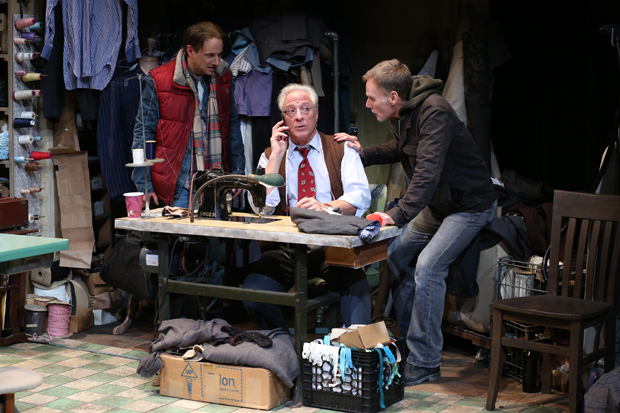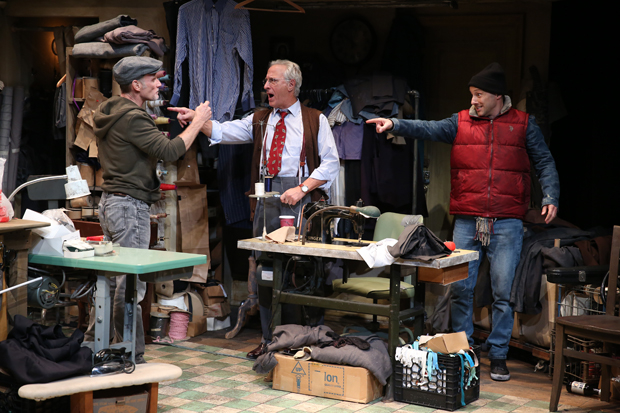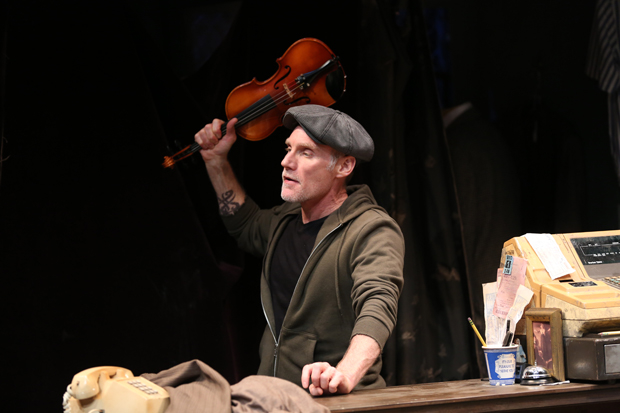
(© Carol Rosegg)
It is reasonable to spend the first act of Dan McCormick's The Violin wondering what era the playwright had in mind when committing ink to paper. From the look of Harry Feiner's overstuffed set (not a digital screen in sight) and Michael McDonald's vintage costumes (complete with a red puffer vest), one might assume late '80s, early '90s. McCormick's dialogue, which sounds drawn straight out of an old Robert De Niro movie, feels similarly dated. In fact, a glance at the program would inform you that this world premiere from the Directors Company at 59E59 is taking place in "present day February." That's just the least example of how this tortured crime caper strains credulity.
The action occurs inside an Avenue A tailor shop where Giovanni (Robert LuPone) spends countless hours hunched over an ancient Singer sewing machine. Gio is like a surrogate father to brothers Bobby (Peter Bradbury) and Terry (Kevin Isola), neighborhood kids who never left Alphabet City. Their parents were murdered by the mob many years ago, leaving Bobby to take care of Terry, who is a bit slow due to a bunk bed accident. Neither man enjoys steady employment, floating between gig jobs and petty crime. But when Terry finds a 1710 Stradivarius in the back of his gypsy cab (in a plot turn very similar to something that actually happened to cellist Yo-Yo Ma in 1999), Bobby sees an opportunity to cash in. He attempts to ransom the $4 million violin for a princely sum that will hopefully lead to a life of "beaches with palm trees."

(© Carol Rosegg)
Of course, such an operation requires seamless coordination, something these nitwits can't seem to manage with all their scab picking. Bobby already resents his "half-retarded" little brother, but he becomes positively incensed when Terry accuses him of taking credit for finding the violin while he's attempting to make the ransom call. Gio mostly responds to this backbiting nonsense with exclamations of "Oh, mio dio," and "basta!" Everyone speaks in an exaggerated "youz guyz" New Yorkese. They also tend to use far more words than is necessary to get a point across, making the play feel slow to develop.
McCormick aims for Scorsese, but ends up hitting Dr. Phil. McCormick has overloaded his script with tearful monologues revealing deep, dark secrets from the past. These revelations provide the only fuel for a less-than-combustible script, one that is overly reliant on one-way phone calls and unearned emotional outbursts. We can understand the appeal for actors looking for a challenge, but not even performers as watchable as LuPone, Bradbury, and Isola can save this show.
At least Joseph Discher directs a handsome production. We can even get behind the antique setting: One of the exciting things about New York City is walking into an old store like Giovanni's with a million-year lease and feeling like you've just stepped into a time warp. Feiner captures that frozen-in-amber quality with his detailed and lived-in set. Matthew E. Adelson's dim lighting also conveys the depressing feeling of New York in February, when there's no point in uncovering the windows because it will be dark by 4pm anyway. Hao Bai's sound design of Puccini is appropriately operatic for a script that is so regularly over-the-top.

(© Carol Rosegg)
Unfortunately, The Violin feels like a lost opportunity, an overwrought melodrama that could have been a dramatic examination of an American legal system that values property over lives. As soon as we hear that these impoverished middle-aged delinquents are up against the Lincoln Center, we know who is going to win in the end. It makes for a dull two hours. The only surprises come when we see just how shameless McCormick is in each successive contrivance, the last of which will leave you with a hearty (if unintended) chuckle.








